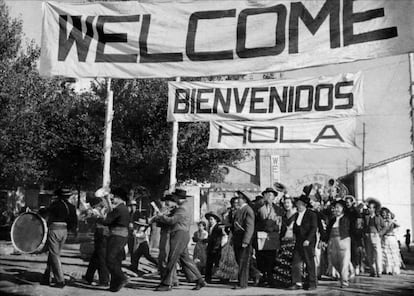Why Spaniards climb on chickens (and other odd expressions)
EL PAÍS explains the origins of some of the strangest sayings used in the Spanish language

The mathematicians can say what they like: sometimes the total isn’t the sum of its combined parts.
Which is to say that words don’t always mean they appear to. Take these Spanish expressions: hay ropa tendida or ponerse las botas, which, literally translated, mean there are clothes out to dry, and to put one’s boots on. They mean one thing, and at the same time, they mean another, which can make life tricky for translators or anybody learning the language.
In reality, these kinds of constructions exist in every language. For Spaniards it’s raining chuzos de punta, but in Britain it’s raining cats and dogs
“Their meaning lies in cultural or social contexts, which are intrinsically rooted in local idiosyncrasies,” says Celia Villar of Fundeu, a recently created website that aims to explain how everyday Spanish works.
Villar cites the example of the timo de la estampita (literally, “the prayer-card con”), which Spain’s Royal Academy of Language describes as a colloquial expression referring to a confidence trick. But as Villar points out, “Germans wouldn’t understand it, not because they don’t know what the words mean in themselves, but because the concept of a con trick isn’t common enough for them to have to come up with an expression to define it.”
In reality, these kinds of constructions exist in every language. For Spaniards it’s raining chuzos de punta (spiked sticks with the pointy end facing down), but in Britain it’s raining cats and dogs. And while the Spanish might wake up after a night’s heavy drinking with a resaca, the Germans have a cat: einen kater haben. Many of these expressions are catalogued in Ignacio Ochoa and Federico López Socasau’s best-seller From lost to the river, a literal translation of the Spanish expression de perdidos al río. They also render dorar la píldora as to plate the pill, and tontolaba as sillybean. The pair has gone on to write two other books listing their literal translations.
These kinds of expressions that don’t mean what they appear to are particularly abundant in Spanish: no wonder the Germans say das kommt mir Spanisch vor, or, it sounds like Spanish to me. Below, a collection of a few key expressions that might leave the novice Spanish speaker in trouble.
Dorar la píldora - Gild the pill
In the days before pills came in capsule form, pharmacists would coat them with something sweet. And from that came this phrase’s meaning as trying to put a positive spin on a situation.
La ocasión la pintan calva - They paint the occasion bald
Opportunity usually has nothing to do with hair… except in this case: Phidias, the ancient Greek sculptor, carved the god of opportunity Kaeros, whom the Romans adopted as Ocasio, with no hair on the back of her neck. This was a way of saying that one should grasp opportunity when it presented itself, not when it had passed.
Ponerse las botas - To put one’s boots on
This expression normally refers to eating a huge meal or doing something on a large scale. Its origin lies in the fact that in the old days, only the wealthy could afford leather boots, and therefore only they would be able to afford to eat heartily.
Hay ropa tendida - There are clothes out to dry
This reference to clothes hanging on the line is a way of saying to the person you’re talking to that there might be somebody eavesdropping. This was once a common expression in prison to warn about the presence of guards.
A palo seco - By dry stick
Typically used to describe a dish that is served without any artifice or accompaniment, the origin is naval, dating back to the days when it was necessary to pull in the sails when navigating through particularly stormy seas.
Otro gallo cantaría - Another cockerel would crow
Just about every mother or grandmother has said this at one time or another when telling a child what he or she should have done. The origin is that great factory of instructions for life, the Bible. If Peter had not denied Jesus three times, another cockerel would have crowed. Think coulda, shoulda, woulda.
Meterse en camisa de once varas - To get into a 33-foot shirt
In other words, to look for problems or get into a mess. And what’s more, somebody else’s mess. The origin has to do with the medieval custom of adopting a baby by placing it in a large shirt via the sleeve and pulling it out through the neck and kissing him or her to seal the deal. The vara was an old Spanish measurement equivalent to three feet.
Salvarse por los pelos - To save oneself by the hairs
Strangely enough, this one has a literal meaning, but that is now lost in the mists of time. Nowadays, it simply means a narrow escape, but in the old days, when few sailors bothered to learn to swim, if they fell overboard, having a pony tail might give those on board something to grab.
Estar en Babia - To be in Babia
Yes, Babia is a real place, in the province of León. The kings of León had their summer residence here, where they would spend many happy months forgetting their regal problems. Which is how it came to mean to be absorbed by something to the point of ignoring everything else.
El quinto pino - The fifth pine
The fifth pine in question used to be on Madrid’s Paseo de Recoletos. There were five pine trees in all, and unsurprisingly, the fifth one was the furthest and most distant. And to this day, when something is en el quinto pino, it means that it is very far away.
No hay tu tía - There is not your aunt
This one doesn’t make much sense in Spanish either, and has nothing to do with aunts. The original expression was no hay atutía, atutía being a medicinal cream made from zinc oxide that soon came to be regarded as a cure-all. And when there is no cure-all…
Hacer la pelota - Do the ball
Something of a national pastime, this has nothing to do with balls of any shape or size. Instead it comes from an old French term for a prostitute. Pimps would encourage these sex workers of yore to be nice to potential clients so as to better fleece them of their money. Hence the term referring to idle flattery.
Montar un pollo - To climb on a chicken
No, this has nothing to do with fowls of any sort, and although Spain’s Royal Academy of Language accepts the current spelling, the original word is poyo, the stone block to be found outside many old houses. The word comes from the Latin, podium, upon which orators would climb to deliver a speech aimed at causing a sensation. These days, montar un pollo means to make a scene.
Sanseacabó - Saintfinished
The lexicographers are unsure about the origin of this Spanish saint given to ending things: there are other variants, such as San Lunes, the patron saint of taking Monday off. But with Saintfinished, as the Spanish would say: con esto y un bizcocho, hasta mañana a las ocho: with this and a sponge cake, until tomorrow at eight.
English version by Nick Lyne.
Sign up for our newsletter
EL PAÍS English Edition is launching a weekly newsletter. Sign up today to receive a selection of our best stories in your inbox every Saturday morning. For full details about how to subscribe, click here.
Tu suscripción se está usando en otro dispositivo
¿Quieres añadir otro usuario a tu suscripción?
Si continúas leyendo en este dispositivo, no se podrá leer en el otro.
FlechaTu suscripción se está usando en otro dispositivo y solo puedes acceder a EL PAÍS desde un dispositivo a la vez.
Si quieres compartir tu cuenta, cambia tu suscripción a la modalidad Premium, así podrás añadir otro usuario. Cada uno accederá con su propia cuenta de email, lo que os permitirá personalizar vuestra experiencia en EL PAÍS.
¿Tienes una suscripción de empresa? Accede aquí para contratar más cuentas.
En el caso de no saber quién está usando tu cuenta, te recomendamos cambiar tu contraseña aquí.
Si decides continuar compartiendo tu cuenta, este mensaje se mostrará en tu dispositivo y en el de la otra persona que está usando tu cuenta de forma indefinida, afectando a tu experiencia de lectura. Puedes consultar aquí los términos y condiciones de la suscripción digital.









































